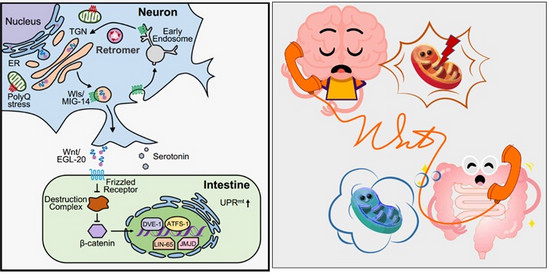The metabolic disorders have been reported in a range of neurodegenerative diseases. Mitochondrial dysfunction, in particular, has been implicated in the pathogenesis of many neurodegenerative disorders, including Parkinson’s disease, Alzheimer’s disease, and Huntington's disease. The mechanism by which the nervous system elicits distal mitochondrial proteotoxic stress remains unknown.Dr. TIAN Ye's team at the Institute of Genetics and Developmental Biology, Chinese Academy of Sciences and Prof. Andrew Dillin's team at UC Berkeley, together found that retromer-dependent Wnt signaling can propagate mitochondrial proteotoxic stress (UPRmt) from the nervous system to the intestine.The findings have been published online on July 26th in Cell entitled "Mitochondrial unfolded protein response is mediated cell-non-autonomously by retromer- Dependent Wnt signaling".Studies in C. elegans have established that the expression of the HD-causing polyQ40 protein in neurons initiates the UPRmtin the intestine, a process that induces global alteration of transcription networks to maintain a functional mitochondrial proteome.Researchers found that loss-of-function mutations of retromer complex components responsible for recycling the Wnt secretion-factor/MIG-14 prevent Wnt secretion and thereby suppress cell-non-autonomous mitochondrial proteotoxic stress. Neuronal expression of the Wnt ligand/EGL-20 is sufficient to induce UPRmt in the intestine and extend lifespan in C. elegans.The study indicates that Wnt signaling propagates the mitochondrial proteotoxic stress and that Wnt pathway components should thus be viewed as therapeutic targets for age-onset neurodegenerative diseases. This work was supported by the National Key R&D Program of China, Strategic Priority Research Program of the Chinese Academy of Sciences, and the National Natural Foundation of China. 
Wnt signaling mediates cell-non-autonomous mitochondrial proteostasis stress (Image by ZHANG Qian)
|



